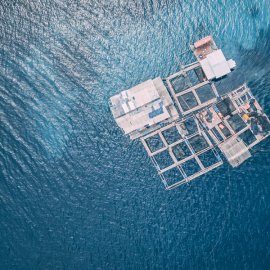The Future of Aquaculture, part two
-
English
-
ListenPause
[intro music] Welcome to World Ocean Radio… We are focusing for the next few editions of World Ocean Radio on the future of aquaculture, specifically the disruptive aspects of new technologies. These discussions are based on an assumption that traditional fisheries are so stressed and threatened by global, over-consumptive activities that, despite well-intended policies and regulations, lack of restricting market forces, regulations, and enforcement will force our need for seafood products away from the ocean to coastal and land-based aquaculture. From what I can see, the trend is inevitable. That said, we need to acknowledge the improvements made by the aquaculture industry in terms of feeds, antibiotics, waste, disease, off-shore structures, water treatment, quality control, and other factors that in the past turned public interest and support for aquaculture toward misunderstanding and opposition. In the meantime, slowly, but relentlessly, innovations and research have addressed many of these problems and allowed certain enterprise to insert farmed produce – salmon and tilapia, for example – into an accepted, profitable product stream in the global market. Even sourcing, identification, and traceability systems have improved to the point that, according to a 2021 Global Aquaculture Industry report, the global market accounts for $180.9 billion in 2020 and is expected to increase to $245.2 billion by 2027, a significant percentage of the global supply—and growing. So, we are already consuming farmed fish and, by so doing, in fact, already reducing demand on waning traditional supply. This will surely continue. Looking forward, one serious disruptive contribution will be novel molecular technologies for genetic improvement, the dreaded GMO, the genetically modified organism, that is anathema to many. Of course, we already consume GMO products—cattle and pigs, grains, and fish—species that have been accepted into certain places in the chain of food production and consumption. The central issue is the negative impact that such foods can have on the human body and on our ability to protect our health against diseases immune to antibiotics and other medicinal responses. The threat is real, and there have been enough examples to drive restrictions, inspections, increased testing, product labelling, and more to protect the community from such threat, specific, real, or otherwise. The argument has been why take the risk, for what reason, if we can avoid or pursue a healthy alternative. This position has driven the renaissance of the organic food movement; a proliferation of GMO-free products, alternative diets and natural probiotics, all part of a reactive industry that thrives on the assumption that GMO is inherently bad and life threatening. It is not an argument to confront here. But it is correct to say that genetic research and applications have provided some extraordinary contributions to life-saving and life extension, to novel medicines, vaccines, and other interventions that have helped human protection and viability, and countered the often devasting impact of such global threats as smallpox, polio, mumps, shingles, flus, auto-immune diseases, and many more, a recognizable and positive contribution to the overall well-being of the world community and the benefit of all mankind. In aquaculture, similar progress is being made: approaches to genomic selection and molecular breeding and genomic editing through CRISPR technology, the adding, removing, and altering of DNA sequence, a process that was a key part in the quick response to the development of the vaccines to protect against the coronavirus and its variants. For many, such vaccines have proven important protection in the present pandemic. It is a complicated, emotional, uncertain choice to accept or deny the health benefit of such technology. It is not a singular situation, and inevitable in many other areas of our lives to come. That too is not an argument to confront here. In terms of providing protein for ourselves and the world, aquaculture, responsibility managed, seems an opportunity not to be missed. Can we build in protections to the threats? Can we manage expanded sea-farmed resources such as kelp, seaweed, and shellfish, in sustainable ways? Can we find a path through genomic methodology to immunize and protect the threats to sea creatures from acidification, toxic and polluting by-products of our other industries, and build a land-based aquaculture industry that contributes importantly to food safety, protein supply, and equitable distribution and availability of seafood products? Should we not open our minds, yes, demand protections, but also pursue innovation that will have serious impact on ourselves and on the billions of others like us who will have to look to the ocean for future sustenance and security. Do we allow our singular fears to deprive us all? That’s the question. We will discuss these issues, and more, in future issues of World Ocean Radio. [intro music]
In this brief series we're exploring disruptive technologies for aquaculture, specific initiatives and other advancements to improve efficiency and safety as a positive contribution to out future food supply and global health. This week we are acknowledging some of the improvements made by the aquaculture industry in terms of feed, antibiotics, waste, disease, off-shore structures, water treatment, quality control, and other factors that have in the past turned public interest and support for aquaculture toward misunderstanding and opposition.
About World Ocean Radio
Peter Neill, Director of the World Ocean Observatory and host of World Ocean Radio, provides coverage of a broad spectrum of ocean issues from science and education to advocacy and exemplary projects. World Ocean Radio, a project of the World Ocean Observatory, is a weekly series of five-minute audio essays available for syndicated use at no cost by college and community radio stations worldwide.
World Ocean Radio is produced in association with WERU-FM in Blue Hill, Maine and is distributed by the Public Radio Exchange and the Pacifica Network.
Available for podcast download wherever you listen to your favorites.
Image
Aquaculture Farm, Singapore
Unsplash @hansonluu
- Login to post comments



